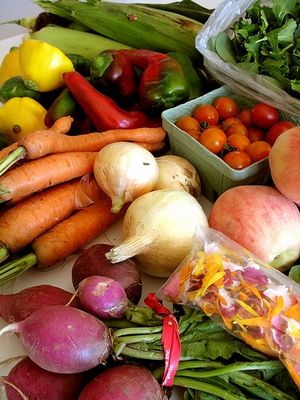What first began as the conscious efforts of a handful of chefs and activists some sixty years ago has recently evolved into the current farm-to-table revolution emphasizing locally grown products.
Some pioneers include Alice Waters, John Jeavons, Wes Jackson, Michael Pollan, and Kentucky’s very own Wendell Berry. Each of these pioneers focused on a different area of the farm-to-table revolution. They were farmers, entrepreneurs, restaurant owners, scientists, and journalists. They were the visionaries who realized that as this country became more and more industrialized, our food was getting further and further away from its roots, literally.
Kentucky’s very own Wendell Berry. Each of these pioneers focused on a different area of the farm-to-table revolution. They were farmers, entrepreneurs, restaurant owners, scientists, and journalists. They were the visionaries who realized that as this country became more and more industrialized, our food was getting further and further away from its roots, literally.
Alice Waters is considered to be the face of the resurgence of the current movement; she opened her restaurant Chez Panisse in 1971. Her menu revolves around local, seasonally fresh food and meats. Chez Panisse has consistently ranked among the World’s 50 Best Restaurants. Waters has been cited as one of the most influential figures in food in the past 50 years and has been called the mother of American food. She is currently one of the most visible supporters of the organic food movement and has been a proponent of organics for over 40 years. Waters believes that eating organic foods free from herbicides and pesticides, is essential for both taste and the health of the environment and local communities.
Organic is a word that is often co-mingled with farm-to-table. But, what does organic mean? Organic foods are produced using methods that do not involve modern synthetic inputs such as synthetic pesticides and chemical fertilizers, do not contain genetically modified organisms, and are not processed using irradiation, industrial solvents, or chemical food additives.
Many restaurateurs here in our neighborhood have embraced the farm-to-table movement and are eager to use locally grown and produced products. Some include the fact that they are using locally grown and raised products on their menus. Many consumers equate the farm-to-table movement with fresher, better tasting and healthier food. How many times have you heard someone say, or better yet experienced for yourself, shopping at your local grocery store and making the purchase of the reddest, most ripe tomato you have ever seen, getting it home, slicing it up and WOW, it tastes like air? Proponents of this movement are trying to convince the masses that they can have access to the freshest, best-tasting food available and it’s literally growing in your own backyard. No more hothouse tomatoes.
While the health benefits boasted by the pioneers of this movement are most certainly significant, there is usually an added cost as well. This is where the quality versus quantity argument can arise. The proof it seems is in the pudding. That is, the remarkable pudding made from Kentucky farm fresh brown eggs, milk from a dairy cow in your state, butter from the same barn and chocolate made in the candy shop in your neighborhood. There is an additional commitment that needs to be made in order to embrace farm-to-table. It’s not the easiest, most convenient or cheapest route. But, say, supporters, it is the best decision you can make in support of your community’s economic health and more importantly, the health of you and your loved ones.

